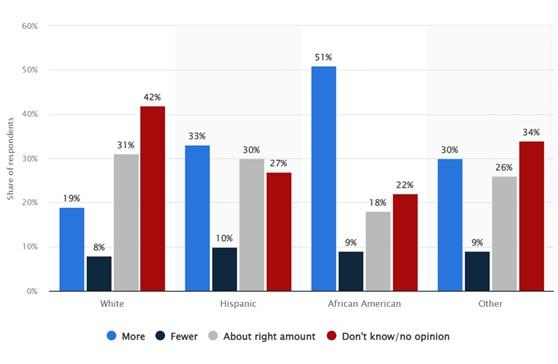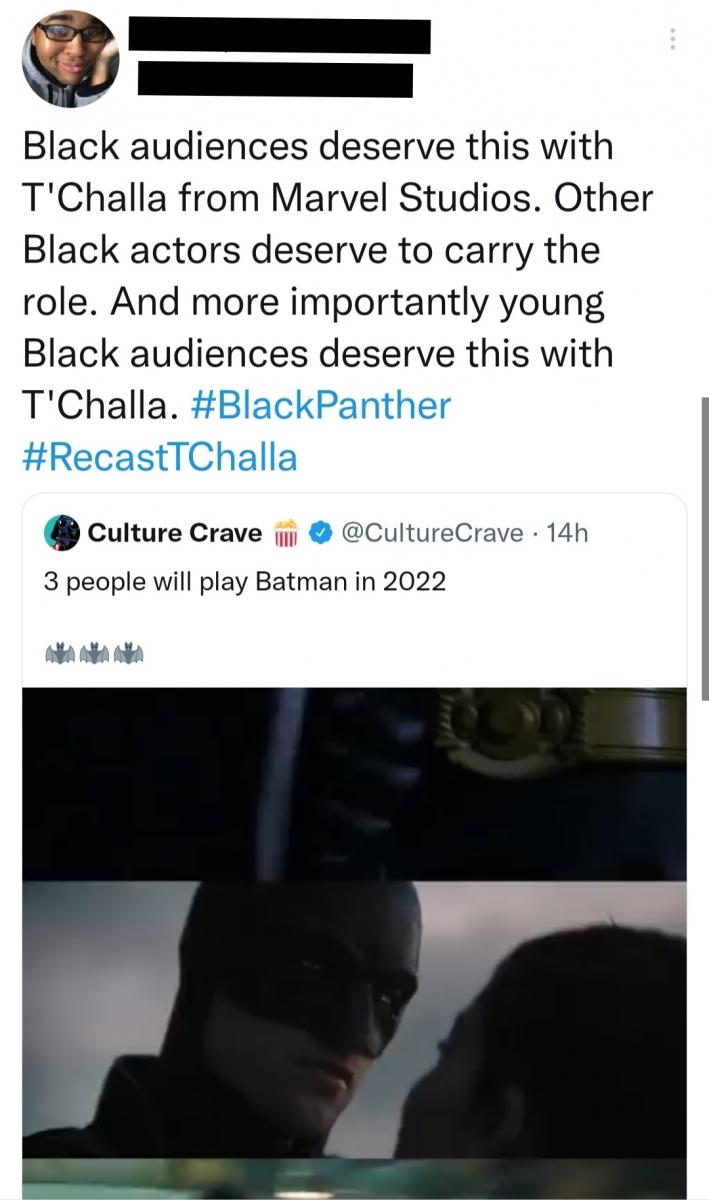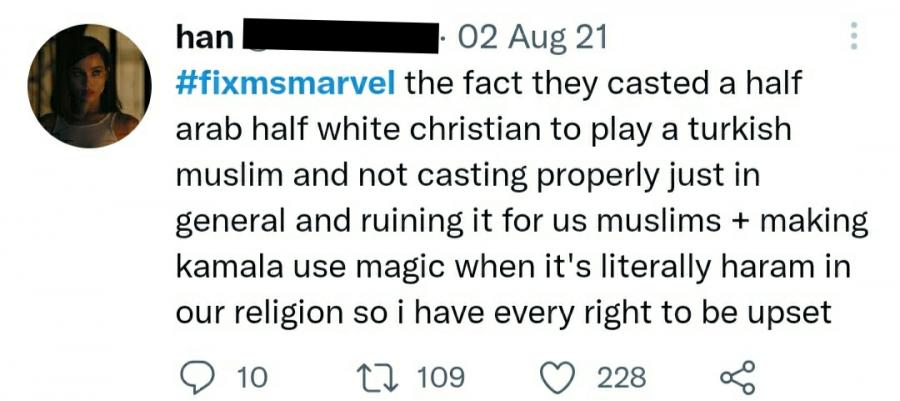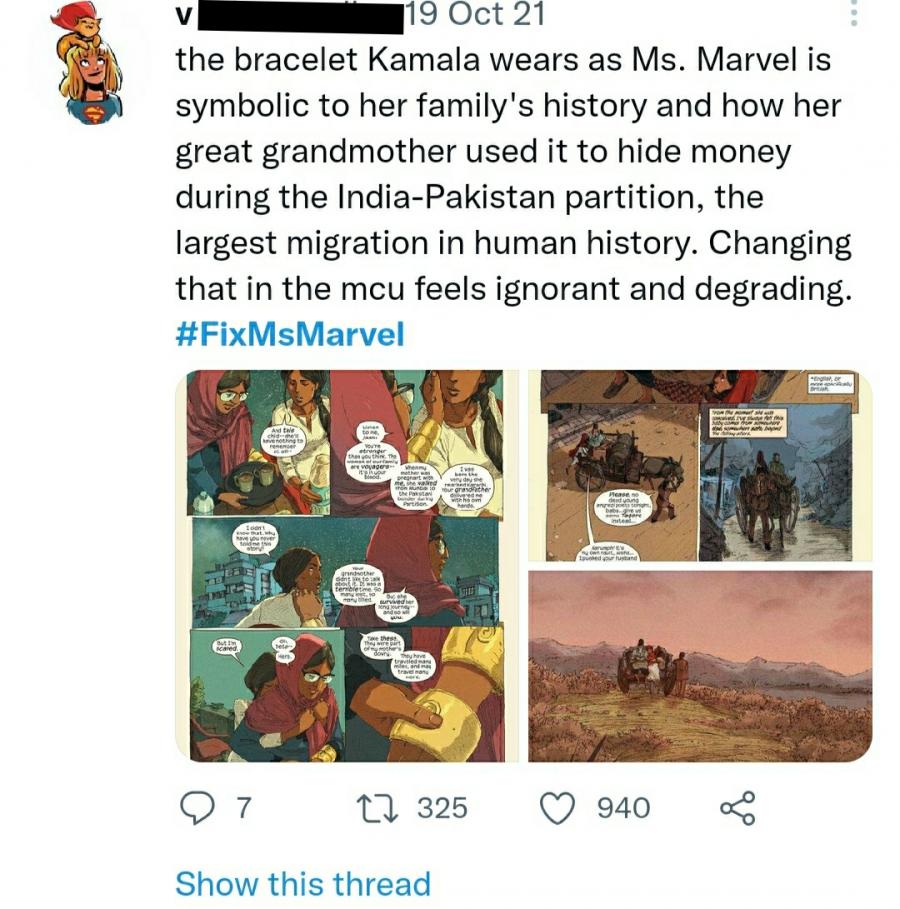
'Ms. Marvel' (2022) and Ethnic Minority Representation in Superhero Series and Cinema
Until the late 2000’s, white, male actors dominated superhero roles in big production series and movies. This is significant as it denied children and adolescents from marginalized groups the possibility of identification with capable superhero characters in positions of power, which has disastrous consequences for both the mental health of marginalized youth and the dominating discourse about minorities. Fortunately, this is starting to change and the superhero genre has been giving more and more recognition to marginalized groups in recent years, including (but not limited to) Asian Americans, African Americans, Muslims and members of the LGBTQ+ community. This change has sparked many debates about what is considered 'good representation' of these minorities.
This article will first break down why the representation of ethnic minorities in superhero productions is an important issue and will then take a look at the controversial Ms. Marvel (2022) series, which has come under fire for certain casting choices and significant changes to the main character. This case will illustrate the debate on ethnic representation in superhero series and cinema and will reveal that, in order to accurately depict a minority, one must embrace all (or at least most) of the characteristics of a comic character’s individual identity that are tied to its group identity in the adaptation.
The Importance of Representation
Although there has been a recent uptick of characters from minority backgrounds in popular media (UCLA College Social Sciences, 2021), the ethnic and cultural representation present in superhero movies and series still leaves much to be desired. More than half of the 28 released Marvel movies since 2008 have had Asian or black characters in supporting roles, but only two (Shang-Chi and Black Panther respectively) have had an Asian or black lead. Most of the 12 movies by DC that were released in that same timeframe have featured black or Asian characters in supporting roles, but none star black or Asian actors in a lead role.* Luckily, there is some diversity to be found in live-action series. Both Luke Cage and the recent Ms. Marvel series star actors from various cultural and ethnic backgrounds in lead roles.
The lack of ethnically diverse leading actors in superhero movies and series is met with an explicit demand from audiences for more representation of ethnic minorities in mainstream media. This is also reflected in the evidence presented in the Hollywood Diversity Report 2021 that suggests that America’s increasingly diverse audiences prefer diverse television and movie content (UCLA College Social Sciences, 2021).
An example of how this demand for more representation translates to the superhero genre comes in the form of the results of a survey by Statista, where respondents were asked whether or not superhero movies should have more characters that represent African people. Of those who had an opinion on the matter, all groups but the group of white respondents had a majority express that they would like to see more representation of African people in superhero movies. (See figure 1.) To be precise, 33 per cent of Hispanics, 30 per cent of those identifying as ‘other’ and 51 per cent of African Americans gave this answer (Navarro, 2021).

Figure 1) Public opinion on whether superhero movies should have more characters that represent African people in the United States by ethnicity
Audiences also express their need for ethnically diverse characters on social media, as was the case after the death of Chadwick Boseman, who played the lead role in the movie Black Panther as king T’Challa and who was a prolific BlackLivesMatter activist.
Fans expressed their appreciation for Boseman online after his passing, but when Marvel announced that they would not be recasting the role of T’Challa in future MCU instalments of Black Panther, many were outraged. A change.org petition was started and the Twitter hashtag #RecastTChalla was born. Not only would not recasting the character go against Chadwick’s wishes, as expressed by his brother Derrick Boseman (Jones, 2021), but as stated in the description of the change.org petition: “If Marvel Studios removes T’Challa, it would be at the expense of the audiences (especially black boys and men) who saw themselves in him. That also includes the millions of fans who were inspired by the character as well.”
Some fans also point to a double standard when it comes to the decision to not recast T’Challa versus the recasting of (white) superheroes for other franchises. The user in figure 2 points out that both black actors and audiences deserve a recasting of T’Challa, just like audiences of the character Batman did in the past.

Figure 2) A fan using #RecastTChalla to argue for the recasting of T'Challa
This kind of representation is particularly important for children and adolescents from ethnic minorities, who often cannot turn to the media for self-definition and identity construction because of the limited amount of ethnic or cultural representation (Ward, 2004). This is reflected in a statement by Sonali Chhotalal, a junior at Cape May Technical High School in New Jersey: “We need to see people that look like ourselves and can say, ‘Oh, that looks like me!’ or ‘I identify with that.’” (Elbaba, 2019).
Particular types of media exposure have also been found to negatively impact the self-esteem of ethnic and minority youth. For example, it was found that identification with popular white, male characters among African American youth was associated with lower self-esteem, whereas identification with popular African American characters was associated with higher self-esteem. Kimore Willis, a junior at Etiwanda High School in California, stressed the same connection between a lack of representation in pop culture and mental health: “It just makes you feel like, ‘Why don’t I see anybody like me?’ [It] kind of like brings your self-esteem down.” (Elbaba, 2019).
Ethnic minority representation is not only important for those belonging to the ethnic minority, but it also has an important impact on how the (white) majority views these ethnic minorities. Furthermore, the quality of the representation (or accuracy) is crucial (Ward, 2004): actors from ethnic minorities should not portray stereotypes and should hold lead roles more often. “Research has shown that there is a significant relationship between exposure to racial/ethnic portrayals in the media and audience evaluations of race/ethnicity in terms of social roles, pro-minority policies and stereotype consistent race-related attitudes and beliefs.” (Behm-Morawitz, 2013, p. 255). This entails that, when minorities are stereotyped in the media, this creates prejudice about groups for majority (white) audiences, which influences real-world judgements and behaviours (Behm-Morawitz, 2013).
One of the most powerful methods for reinventing a national culture, including a country’s norms and values, is television fiction.
Another way in which the representation of minorities influences real-world judgements and behaviours is through its construction of the national identity as being culturally and/or ethnically homogenous. Media scholar Enric Castelló argues that one of the most powerful methods for reinventing a national culture, including a country’s norms and values, is television fiction (Castelló, 2009). Unquestionably, superhero series and superhero movies are part of this representation of a national culture and, as most superhero movies and series take place in and are produced in the United States of America, the national culture presented by superhero movies and series is often that of the USA. The character of Captain America, for example, portrays values such as patriotism and liberty, whereas the character of Iron Man represents America’s entrepreneurial spirit and free-market ideals.
However, along the same lines, not having a representative number of minority characters can construct the national identity as being culturally and/or ethnically homogenous and therefore deny minorities the recognition of being American citizens. Moreover, not having an adequate number of minority lead actors communicates to the national audience that people from a minority background are not ‘leader’ or ‘hero’ worthy, exacerbating minority stereotypes that already exist in the public consciousness. As the Harvard Political review remarks: “As superhero films progress, black characters remain in supporting roles. Characters like Avengers’ Nick Fury, Man of Steel’s Perry White, and Captain America: Winter Soldier’s Sam Wilson are an important part of the core group of characters, but they are never the leader.” (The Superhero Diversity Problem, 2014).
In the following section, a case will be discussed in which an actor from an ethnic minority background does have a lead role and in which other characters from minority backgrounds also play important roles; Ms. Marvel, a Disney+ series that is being criticized as a controversial example of representation.
The Good, the Bad and the Controversial about Ms. Marvel (2022)
The Ms. Marvel series on Disney+ follows the story of Kamala Khan; an Avengers obsessed 16-year-old Pakistani-American from Jersey City, who suddenly gains superpowers like the heroes she is such a big fan of (De Groot, 2022). Although the upcoming series was initially praised for its casting of the main heroine and for its focus on the story of a young, Muslim, female superhero of colour, many were critical of subsequent other choices that were made. This led to the creation of the trending hashtag #fixmsmarvel (Pedd, 2020; Tasker, 2021).
The casting of the newcomer Iman Vellani was praised by fans and critics for staying close to the original portrayal of the comic character, but the public was not as positive about a lot of the other castings. Many think that Marvel completely missed the mark by casting Yasmeen Fletcher — a half-white Christian — in the role of Kamala’s best friend Nakia, who comes from a Turkish family of devout Muslims and who is always portrayed as wearing a hijab. Although Fletcher did confirm that she will be wearing a hijab in the series, many, like the Twitter user in figure 3 who is Muslim and who therefore feels justified in critiquing a portrayal of Muslim culture, see this as a disingenuous appropriation and would rather see a hijabi actress in the role.

Figure 3) A Muslim Twitter user expressing disappointment about Nakia's casting and Kamala's changed powerset
Fans also had problems with the casting of Aramis Knight who will be playing Kareem (Red Dagger) and Zenobia Shroff — a non-Muslim, Indian actress —, who will be playing Kamala’s Pakistani mother. Knight, in particular, was criticized for being ‘white-passing’, meaning that he phenotypically could pass and be accepted as a white American citizen, escaping the discrimination that many people of the same ethnicity face. Unless his ethnicity is explicitly explored in the series, this also means that audiences can easily interpret him as white, nullifying the positive effects of minority representation earlier discussed in this text.
In addition to the casting missteps, two main changes to Kamala’s character are also heavily criticised. The first of these changes is that her set of powers and the origin of these powers is changed. In the comics, Kamala gets her shapeshifting abilities from exposure to Terrigen Mist, a substance that can alter the biology of inhuman characters like Kamala. However, in the Ms. Marvel series, Kamala is said to gain the power of energy constructions instead. Many fans, like the Twitter user in figure 3, are concerned that Kamala will gain these powers through magical, rather than biological means, which is considered Haram (forbidden) in the religion of Islam. This change would therefore create friction in how her own identity relates to the identity of the cultural group of which she is a part.
The second of these controversial changes relates to Kamala’s cultural heritage; Kamala’s signature bracelet was not present in the design of her superhero outfit shown in the promotional images. Many fans were upset that this bracelet is missing from her design as it is an important part of the ethnic and cultural history of her family, as explained by a Twitter user in figure 4. Removing an object that is so closely tied to Kamala’s personal ethnic identity also removes a visible tie to the ethnic group she belongs to, weakening the on-screen representation of her ethnic heritage and identity.

Figure 4) A Twitter user explaining the significance of Kamala's bracelet
What Ms. Marvel shows is that good representation is not just about accurately representing the phenotypical characteristics of a comic character on screen, avoiding stereotypes, or about the quantity of characters in lead and supporting roles. It is also about embracing all parts of an adapted character’s individual culture that tie them to the identity of the ethnic and/or cultural group they belong to.
As seen in the backlash against the casting of Knight and Shroff, a match of an actor's phenotypical characteristics and ethnic background with the character they are portraying plays a large role in the acceptance of a casting choice. However, especially for a lead comic character like Kamala, the adaption of other elements of a character’s individual culture that are tied to their ethnic identity are also important in the writing and casting of an on-screen character. As discussed, the changes to Kamala’s character are criticized for creating fiction in relation to the identity of the group culture she subscribes to.
Conclusion
Despite the increasing inclusion of ethnic minorities in superhero movies and series in recent years, there is still a large demand for more representation. Not only is this positive for the identity construction and the mental health of ethnic minorities themselves, but it also reduces prejudices of majority audiences and constructs a more diverse view of the USA’s national culture.
However, as shown by the example of Ms. Marvel, accurately adapting a comic character who belongs to an ethnic minority in a movie or series is a nuanced affair. Correctly representing the phenotypical characteristics of a comic character on screen is not enough as this is only one part of someone’s individual culture and identity. To accurately adapt a comic character from an ethnic minority, a series or movie must embrace all characteristics of a character’s personal identity that ties them to the culture of the ethnic group that they subscribe to, including their religion, their norms and values, their behaviour, their language and their cultural heritage.
* The term ‘lead role’ is defined in this paper as the first credited actor of a given project’s list of cast members. This is the same definition that the ‘Hollywood Diversity Report 2021’ employs.
References
Ali, B. K. (Creator), & El Arbi, A., Fallah, B., Menon, M., Obaid-Chinoy, S. (Directors) (2022). Ms. Marvel. Marvel Studios.
Behm-Morawitz, E., & Ortiz, M. (2013). Race, ethnicity, and the media. In K. E. Dill (ed.), The Oxford handbook of media psychology, (pp. 252-266). Oxford University Press.
Castelló, E. (2009). The nation as a political stage. A theoretical approach to television fiction and national identities. The International Communication Gazette, 71(4), 303-320.
De Groot, B. (2022, January 6). Dit is ‘Ms. Marvel’: wordt deze moslim-superheld de nieuwe grote hit? Filmtotaal.
Elbaba, R. (2019, November 14). Why on-screen representation matters, according to these teens. PBS.
Jones, D. (2021, December 29). ‘Black Panther’ fans call on Marvel to recast the film’s lead character T’Challa. NME.
Navarro, J. G. (2021, August 12). Public opinion on whether superhero movies should have more characters that represent African people in the United States as of April 2019, by ethnicity. Statista.
Pedd, J. (2020, December 8). Marvel Studio-fans zijn kritisch: #fixmsmarvel trending in de Verenigde Staten. Filmtotaal.
Tasker, C. (2021, December 15). Marvel Actress Addresses Her Controversial Casting at ‘No Way Home’ Premiere. InsideTheMagic.
The Superhero Diversity Problem. (2014, October 24). Harvard Political Review.
UCLA College Social Sciences. (2021). Hollywood Diversity Report 2021.
Ward, L. M. (2004). Wading through the stereotypes: positive and negative associations between media use and black adolescents’ conceptions of self. Developmental Psychology, 40, 284-294